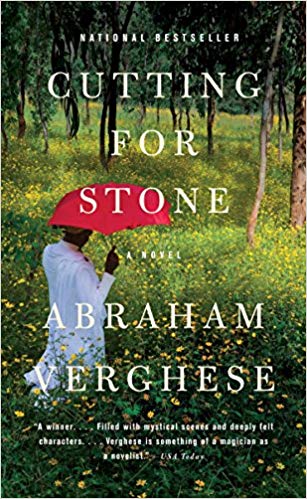Cutting for Stone is a book I should have read years ago

How had I not read Cutting for Stone before? From Ethiopia to New York, Abraham Verghese weaves a stunning story of medicine, learning, love, and heartbreak.
As a teenager I worked in my village bookshop; a tiny little shop stacked floor to ceiling with books, its shelves overflowing onto every table and windowsill. I loved working there. I’d track down rare books for customers and process purchases when they came into the shop.
My job was also to recommend books. We all had go-to recommendations: mine leaned towards the classics, while the bookshop owner always recommended Cutting for Stone by Abraham Verghese.
Somehow I never read the book back then. I really should have, though.
“According to Shiva, life is in the end about fixing holes. Shiva didn’t speak in metaphors. fixing holes is precisely what he did. Still, it’s an apt metaphor for our profession. But there’s another kind of hole, and that is the wound that divides family. Sometimes this wound occurs at the moment of birth, sometimes it happens later. We are all fixing what is broken. It is the task of a lifetime. We’ll leave much unfinished for the next generation.”
Cutting for Stone tells the tale of two identical twins, Shiva and Marion, who are conjoined until birth but remain “ShivaMarion” throughout life, even after bitter betrayal separates them.
Marion is our narrator of Cutting for Stone, who sets the scene in Addis Ababa’s Missing Hospital (a mispronunciation of “Mission Hospital”). He opens the novel with these first lines:
“After eight months spent in the obscurity of our mother’s womb, my brother, Shiva, and I came into the world in the late afternoon of the twentieth of September in the year of grace 1954. We took our first breaths at an elevation of eight thousand feet in the thin air of Addis Ababa, capital city of Ethiopia…”
It’s a big book at 534 pages and in the ground it covers; from beginning to end, it spans lifetimes, including countless personal, national and international upheavals in those years.
I loved reading Cutting for Stone for a few reasons. I loved how it celebrates knowledge, learning, and especially, medicine. I loved it for the non-traditional home that Shiva and Marion grow up in (“Wasn’t that the definition of home? Not where you are from, but where you are wanted.”)
I loved it for how it made me think about my own life and work. If you want to consider switching careers to medicine, read this for a little push. I had a not-insignificant career crisis while reading this book, lamenting how I could be using my brain for more impactful work.
For me, books that bring up feelings like these are among the very best; causing you to question your life and start making real changes, whether it’s pivoting your career, making changes to look after your body better, or improving relationships and leaving negative ones.
I loved getting to know its characters, not because they’re excellent role models – they have many unappealing moments, especially in the second third of the book – but because they’re so flawed. Not one character is perfect or blameless.
Although the book starts off slow, by the halfway point I knew it was going to be one of my all-time favourites. If there’s a formula for a perfect novel, Abraham Verghese nails it with Cutting for Stone.
“God will judge us, Mr. Harris, by–by what we did to relieve the suffering of our fellow human beings. I don’t think God cares what doctrine we embrace.”
Enjoy more from me
- Retreat into my new book, Your Life in Bloom: Finding Your Path and Your Courage, Grounded in the Wisdom of Nature.
- I'm also the author of Mountain Song: A Journey to Finding Quiet in the Swiss Alps, a book about my time living alone by the mountains.
- If you love books, are feeling a little lost right now, and would love some gentle comfort and guidance, join The Sanctuary, my seven-day course to rebalance your life.

